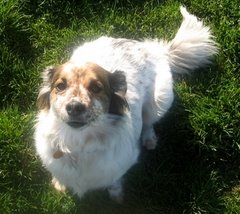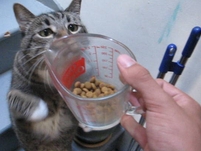

As most of you know, it's vital to socialize your dog. A new puppy has a 'socialization window' from about7 to 16 weeks. This is the prime time to expose your pup to as many different kinds of people, dogs, and experiences (walking over grates, bikes, loud noises) in a positive way...every day. A trainer friend told me a pup should meet 7 new people a day of different size, sex, color and age. Socialization does not stop at 16 weeks, of course, but that window does close and it becomes more difficult. Ian Dunbar says a pup should have met 100 new people by the 12th week. This crucial time is when the puppy's basic character is set. Because this human socialization period occurs at the same time as the first 'fear imprint stage' (from about 8 - 11 weeks) it's imperative that all these experiences with new people are positive. If a pup shies away from a new person, don't coddle him "aww, it's ok"...that's how you make him afraid of people! Anything that frightens a puppy at this time will have a more lasting effect than any other time in his life! A second fear period happens between 6 and 14/18 months. You may notice the pup has become suddenly timid. They may also show reactivity/aggression and/or territorial behavior. In addition, this is also the beginning of the 'teenage' stage where all previous trained commands may fly out the window!
I have not raised a puppy for over 20 years. My current dogs had aggression/reactivity issues with other dogs when I adopted them...but, with consistent training and management, they have learned to be canine good citizens. They have no fear or aggression towards people. I got them as adults, so someone did something right when they were puppies. I am also grateful I live in a city that is so dog friendly. They get socialized 3 -4 times a day just by taking our walks. If we lived in the country or suburbs, I doubt this would ever happen. I still continue to socialize them and let people pet them whenever possible. Roman and Tikka love attention from all people but they are also polite and don't go soliciting it.
Tikka got to hang out with my second graders again and just stood there, wagging her tail. She had 16 pairs of hands petting her and she was happy to give a few kids a kiss.
Well, Tikka and Roman are unofficial therapy dogs. I think this summer we will make it official.






3 comments:
Great post! socializing is so important for puppies and adult dogs too. Also, thank you for following our blog. We can trade links if you'd like. let us know.
Thank you! I enjoy reading your blog, as well...especially since all my dogs have been rescues and my current two are from Grateful Dogs (they failed behavior at ACC, but with a lot of work and patience, both have passed the ATTS Temperament Test and both are Canine Good Citizens and working in rally obedience).
Some dog owners don't like when I tell them the training and socialization never stops, but if you want a balanced dog, it can't!
Me too, i'm glad i live in an urban environment where Lottie can meet tons of different kinds of people, all ages, all colors, etc. And we are surrounded too by dog owners - thank goodness - so she has had lots of dog socialization too.
She is an adolescent now and i've noticed the timid/fear thing coming out, we need to help her overcome that. Thanks for posting this and also for the helpful comments you gave when she was a younger puppy, about exposing her to all sorts of situations - bikes, skateboards, etc - so she wouldn't be afraid of them.
Reading your post, i wonder if this wisdom could be applied to humans too - I notice that young children who've been around lots of different people, not only mom and dad, seem a lot more adaptable to new situations.
Post a Comment